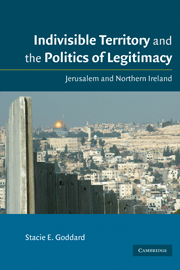Book contents
- Frontmatter
- Contents
- Acknowledgments
- 1 Introduction
- 2 Constructing Indivisibility: A Legitimation Theory of Indivisible Territory
- PART ONE CONSTRUCTING AN INDIVISIBLE IRELAND
- PART TWO JERUSALEM: THE ETERNAL INDIVISIBLE CITY
- Introduction
- 5 Dividing the Holy City
- 6 Jerusalem, Indivisible
- 7 How Northern Ireland Became Divisible (and Why Jerusalem Has Not)
- 8 Conclusion
- Bibliography
- Index
5 - Dividing the Holy City
from PART TWO - JERUSALEM: THE ETERNAL INDIVISIBLE CITY
Published online by Cambridge University Press: 26 January 2010
- Frontmatter
- Contents
- Acknowledgments
- 1 Introduction
- 2 Constructing Indivisibility: A Legitimation Theory of Indivisible Territory
- PART ONE CONSTRUCTING AN INDIVISIBLE IRELAND
- PART TWO JERUSALEM: THE ETERNAL INDIVISIBLE CITY
- Introduction
- 5 Dividing the Holy City
- 6 Jerusalem, Indivisible
- 7 How Northern Ireland Became Divisible (and Why Jerusalem Has Not)
- 8 Conclusion
- Bibliography
- Index
Summary
INTRODUCTION
From the beginning of the British Mandate in 1920 to Israel's declaration of independence on May 14, 1948, Jerusalem's status was intricately bound to the fate of Palestine. Under the terms of the Sykes-Picot agreement (1916), France and Britain carved discrete states out of the Ottoman Empire, creating mandates under their control. Left undivided was the Mandate of Palestine, a territory stretching from the Jordan River to the Mediterranean Sea. During the twenty years of the British Mandate, Zionists – the Jewish leaders who sought an independent state – declared that the British had promised them a homeland in Palestine. Arab leaders protested Zionist claims, contending that they would settle for nothing less than an independent state in all of Palestine.
By the 1930s, increasing violence between Jews and Arabs convinced the British that a unified Palestine was untenable. From 1936 to 1939, Palestinian Arabs revolted against British control and Jewish settlement. In response to the Arab Revolt, the British government established a Royal Commission, under the direction of Sir Edward Peel, to uncover the underlying causes of the violence and improve the effectiveness of British rule. After hearing testimony from Zionist and Palestinian Arab leaders, the Peel Commission declared that a unified Jewish-Palestinian state was impossible. “Manifestly, the problem cannot be solved by giving either the Arabs or the Jews all they want.” Although partition of Palestine might have disadvantages “half a loaf is better than no bread…drawbacks of partition are outweighed by its advantages.
- Type
- Chapter
- Information
- Indivisible Territory and the Politics of LegitimacyJerusalem and Northern Ireland, pp. 124 - 158Publisher: Cambridge University PressPrint publication year: 2009

